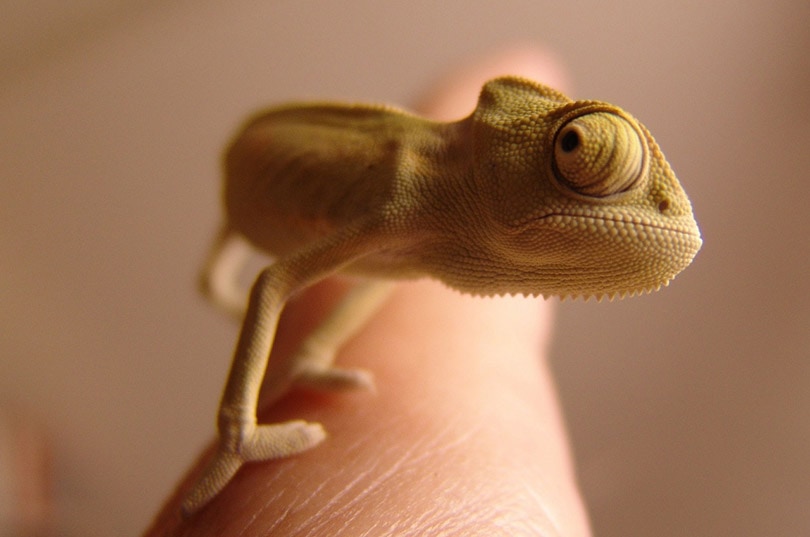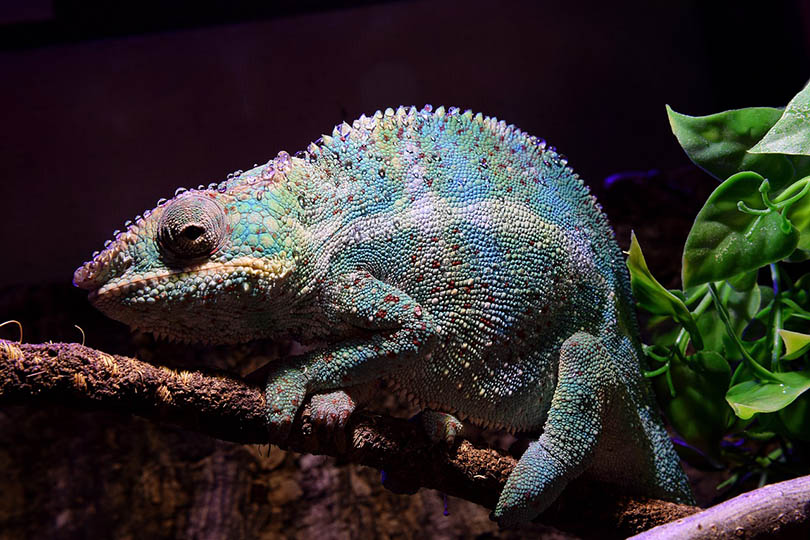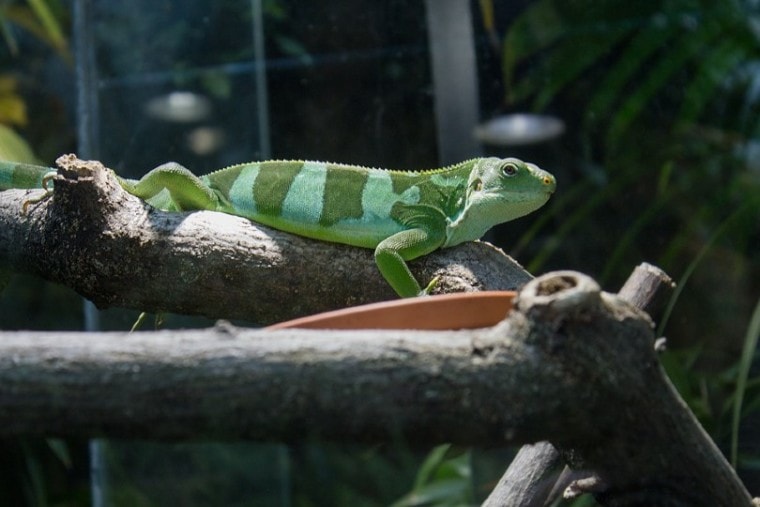
Fiji Banded Iguanas are aptly named after their home, the Fijian islands. Until recently, these lizards were believed to be identical to Lau Banded Iguanas, but within the last few decades, they are two separate species. To learn more about Fiji Banded Iguanas, keep reading our guide.
Quick Facts About Fiji Banded Iguanas
| Species Name: | Brachylophus bulabula |
| Family: | Iguanidae |
| Care Level: | Moderate |
| Temperature: | Basking temperature of 95° F; 75°F at night |
| Temperament: | Docile |
| Color Form: | Green with blue and green stripes (males); green with white or blue spots (females) |
| Lifespan: | 10-15 years (up to 25 years in captivity) |
| Size: | 7.5-22 inches |
| Diet: | Primarily herbivores; occasionally eat insects |
| Minimum Tank Size: | 46” x 36” |
| Tank Set-Up: | Plenty of ventilation; a basking spot on one side, a cooler spot on the other |
| Compatibility: | Compatible with other Fiji Banded Iguanas if both are not male |
Fiji Banded Iguana Overview
The Fiji Banded Iguana, not to be confused with the Lau Banded Iguana, is a species of iguana that is native to the South Pacific. Their natural habitats are the wet forests of Fiji. These reptiles are primarily arboreal, but they are also very adept at swimming. Like many iguana species, the Fiji Banded Iguana has a long life expectancy; while they are thought to live around 10-15 years in the wild, they can live up to 25 years in captivity.
Because the Fiji Banded Iguana was thought to be the same species as the Lau Banded Iguana until relatively recently, there is not as much information about these animals available online. What we do know is that these lizards are considered to be an endangered species. Conservationists believe the population of Fiji Banded Iguanas has decreased by about 50 percent just within the last 40 years or so. The primary reasons for this dramatic decrease in population include deforestation, mining, and new predators brought by human development such as rats and feral cats. Although they are not yet extinct as a whole, these iguanas are extinct on some of the islands of Fiji. According to the Smithsonian, they are protected from international trade, but there aren’t currently any other measures being taken to promote conservation.
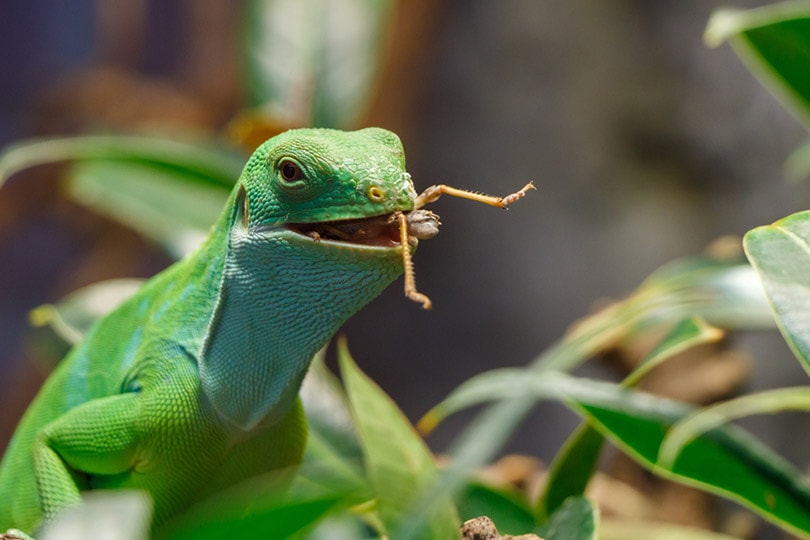
How Much Do Fiji Banded Iguanas Cost?
If you want to purchase a Fiji Banded Iguana, you should expect to pay a lot of money for it. They are not easy to find online and you are not likely to find one in your local pet store. As a result, you could end up paying up to $1,000 for one of these iguanas.
Typical Behavior & Temperament
These iguanas are diurnal, which means they are active during the day. In the wild, they forage for food on the forest floor by day and climb to the treetops to hide from predators at night. In addition to climbing trees, the Fiji Banded Iguana also happens to be very good at swimming.
Fiji Banded Iguanas happen to be much smaller than other popular iguanas on the pet trade, meaning they are much easier to handle. With some training, you can teach your iguana to be comfortable being held by you. Do not take your iguana by surprise or chase it to pick it up; offer it some food and let it come to you. It may take some time for your iguana to get used to you, but once it knows it can trust you, picking it up should be easy.
Appearance & Varieties
Fiji Banded Iguanas are very brightly colored lizards compared to other iguanas; males have an emerald green body with green or blue stripes, while females are almost entirely green with less pronounced white or blue spots. These small iguanas have spines that run down their backs and their tails are twice as long as their bodies. You will notice that their eyes are an orange-yellow color.
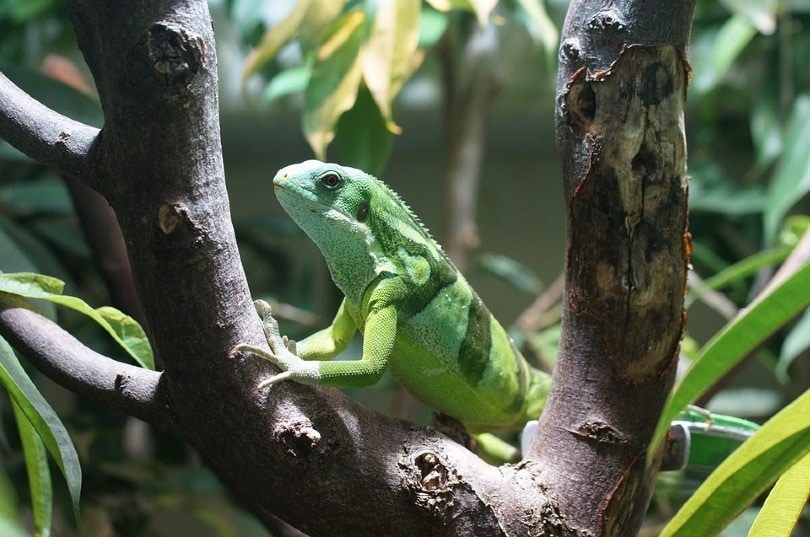
How to Take Care of Fiji Banded Iguanas
Habitat, Tank Conditions & Setup
Although Fiji Banded Iguanas are smaller than other iguanas, they still require a lot of space. Ideally, your iguana’s vivarium should be around 4 feet long and 3 feet tall. The reason the vivarium needs to be so tall is that Fiji Banded Iguanas spend much of their time in trees. A vivarium with a good amount of height allows them to climb as they would in the wild.
Fiji Banded Iguanas are indigenous to a warm, humid climate, so their habitat in captivity should imitate this climate. They need an enclosure that has high humidity since they are accustomed to the wet forests of Fiji. To help maintain a high level of humidity, use soil as your substrate and mist the enclosure regularly.
During the day, you should provide your Fiji Banded Iguana with an area for basking. The basking temperature should be very hot at around 95° F. At night, the temperature of the enclosure should be about 75° F. You can provide a dark, warm, nighttime environment for your lizard by using a ceramic lightbulb as a heat source. Keep a thermostat on your iguana’s enclosure to be sure you are maintaining the proper temperatures.

Do Fiji Banded Iguanas Get Along with Other Pets?
Fiji Banded Iguanas can typically be housed in pairs without an issue as long as both of your lizards are not male. Like many iguana breeds, male Fiji Banded Iguanas tend to get territorial and will attempt to assert their dominance over other males. They can become quite aggressive with one another if they are housed in the same enclosure. Male and female Fiji Banded Iguanas can typically be housed together without any problems;, if you are hoping to breed your iguanas, this may be advisable as it can help promote bonding, which could make your lizards more likely to mate.
What to Feed Your Fiji Banded Iguana
In the wild, Fiji Banded Iguanas eat primarily flowers, leaves, and fruit. In captivity, they are still primarily herbivores, though they do eat the occasional insect. Like humans, they need a variety of foods for their nutritional needs to be met.
You can feed these iguanas greens just about every day of the week, but avoid feeding them spinach or iceberg lettuce. Spinach can cause problems due to oxalates, which can bind calcium and ultimately prevent absorption in your iguana’s gut. If you happen to buy a mix that includes spinach, your iguana will likely be just fine. Avoid iceberg lettuce because it does not contain any nutritional value and can fill your iguana up, preventing him from getting the nutrients he needs from other foods.
They can have fruit up to two or three times a week. Some great choices are melons, mango, and papaya.
Keeping Your Fiji Banded Iguana Healthy
In addition to eating a balanced diet of greens, fruits, and vegetables, your Fiji Banded Iguana will need some dietary supplements to ensure that his nutritional needs are met. All you need to do is sprinkle your iguana’s food with supplements before feeding. These animals are prone to calcium deficiency, so providing your animal with calcium and vitamin D supplements is crucial. In addition to dietary supplements, you should also make sure your Fiji Banded Iguana has a chance to make its own vitamin D3 by exposing it to UVB (ultraviolet B) lighting, especially if he gets no exposure to the sun.
Breeding
Breeding season for Fiji Banded Iguanas occurs in November in the wild. However, these iguanas often mate more frequently in captivity; if you are breeding your pet iguanas, you could get hatchlings during any month of the year.
Before mating, male Fiji Banded Iguanas will approach the female while bobbing its head and flicking its tongue to get her attention. After mating is complete, the female will lay up to six eggs. She will burrow to create a nest for her eggs. You will notice the female Fiji Banded Iguana guarding her nest while she waits for her eggs to hatch.
Are Fiji Banded Iguanas Suitable For You?
Overall, Fiji Banded Iguanas can make interesting pets. Because they are primarily active during the day, you will get a chance to observe your iguana in action. If you are looking for a relatively small iguana that you can accommodate in your home, this species could be a good choice. However, you should keep in mind that iguanas are not necessarily low-maintenance pets; they require a very specific habitat that closely mimics their natural habitat. They can also be expensive to purchase because of their relative rarity and their endangered status. Given how difficult it can be to find one of these reptiles, you may find a different species to be more practical.
Next on your reading list:
Featured Image Credit: simonprodl, Pixabay


